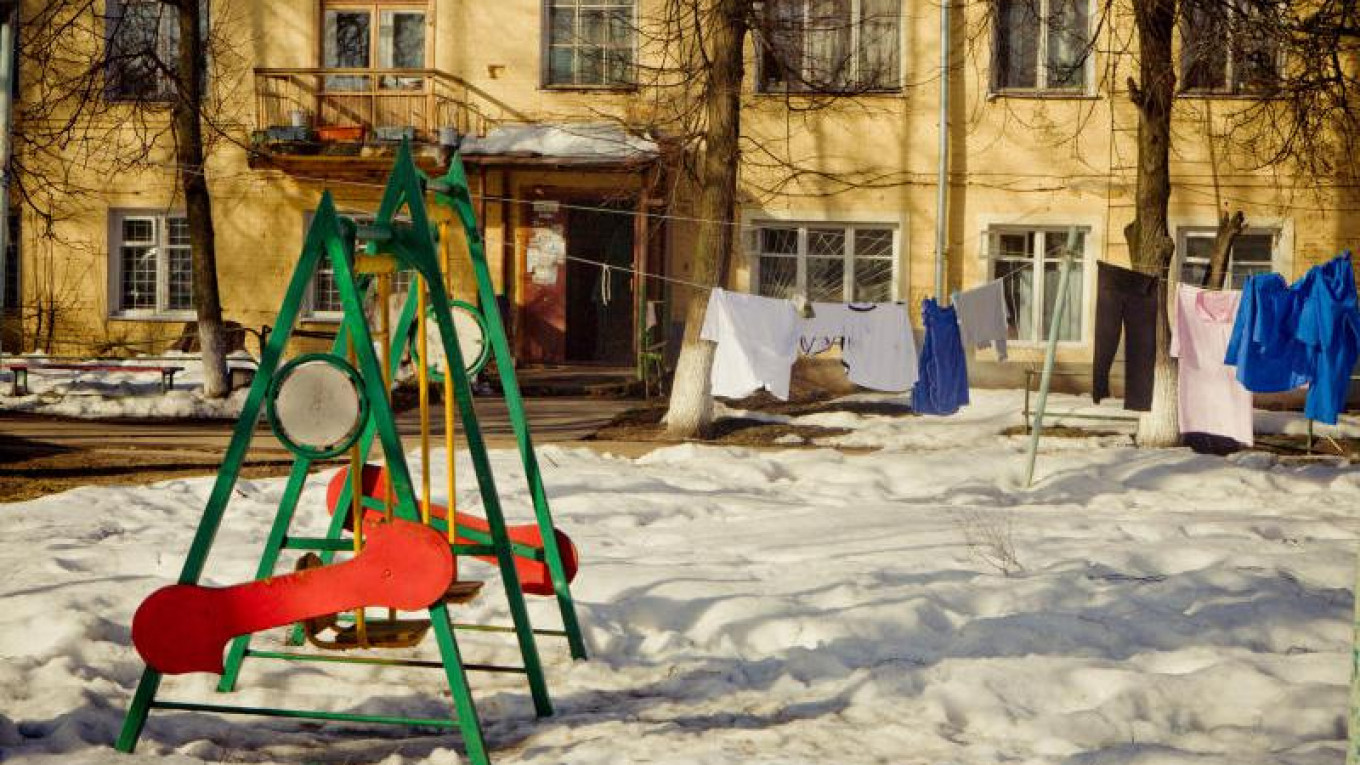Двор: yard, court, outside
Thank heavens that the Russian language isn’t just made up of words that are impossible to understand and translate like жупелизация (bogeymanization). There are all kinds of down-home, basic words and concepts —like двор (courtyard).
If in St. Petersburg visiting students soon learn what парадное is (the main entrance to an apartment building in the idiom of the northern capital), in Moscow we all learn what двор is: the courtyard of your apartment building. It might be covered in asphalt with a few benches, or have a patch of grass and some flowers. If you’re lucky, there will be a playground and hockey-soccer pitch. No matter what’s there, your двор very quickly becomes part of your home. It’s where you pace and smoke a cigarette after a bad day at work, or where your elderly neighbors sit and gossip. It’s where you try to park your car, and where you clean your carpet in the first snow. Years later when people who have lived in Moscow hear the word двор, this is the image that appears in their mind’s eye, complete with the sound effects of kids shouting as they play and the scrape, scrape, scrape of the дворник (janitor, yard man) shoveling snow in the predawn hours of winter.
Of course, there are tricky bits to двор. Take the preposition you use: во дворе or на дворе? Answer: Both. It depends on your meaning. If you are talking about something in your specific courtyard, then the preposition is во: Пацаны во дворе помогли мне поймать котов (The kids in the courtyard helped me catch the cats.) But if you are talking about something happening outside in general — instead of inside — then the preposition is на: Он выносил нищему тарелку супа с куском хлеба и говорил: "Ешь! ― но на дворе" (He brought the beggar a bowl of soup and slice of bread and said, “Here — have something to eat. But outside.”)
In Russian people often speak about the weather на дворе as if it might be snowing outside while a tropical storm raged inside: Приехали в заснежённую Москву, на дворе ― декабрь (We arrived in snow-covered Moscow — it was December, literally “outside it was December.”) But it’s also the standard phrase to use as you decide which coat to grab: Как там на дворе? (What’s it like outside?)
At the dacha, двор is your yard, where you have your vegetable garden, grill shashlyk, and walk to another very important little building: Удобства, как принято говорить, во дворе (The facilities, as they say, are in the yard.)
But when talking about a Russian village, двор means the holdings of a family, which might include a house, shed, barn and land. В деревне были больше десяти дворов (The village had more than ten homesteads.)
In some cases двор refers to a kind of technical shop where something is made, like монетный двор (the mint) or машинный двор (engine yard). And then there is Гостиный двор, originally something like a caravansary — a place where гости (traveling merchants) sold and stored their wares.
And finally, there is двор in the sense of a royal court: В былые времена в зимний Йер выезжал королевский двор (In times gone by, the royal court traveled to Hyeres in the winter.)
From a parking spot to a royal family and retinue, двор covers a lot of ground.
Michele A. Berdy is a Moscow-based translator and interpreter, author of “The Russian Word’s Worth,” a collection of her columns
A Message from The Moscow Times:
Dear readers,
We are facing unprecedented challenges. Russia's Prosecutor General's Office has designated The Moscow Times as an "undesirable" organization, criminalizing our work and putting our staff at risk of prosecution. This follows our earlier unjust labeling as a "foreign agent."
These actions are direct attempts to silence independent journalism in Russia. The authorities claim our work "discredits the decisions of the Russian leadership." We see things differently: we strive to provide accurate, unbiased reporting on Russia.
We, the journalists of The Moscow Times, refuse to be silenced. But to continue our work, we need your help.
Your support, no matter how small, makes a world of difference. If you can, please support us monthly starting from just $2. It's quick to set up, and every contribution makes a significant impact.
By supporting The Moscow Times, you're defending open, independent journalism in the face of repression. Thank you for standing with us.
Remind me later.








